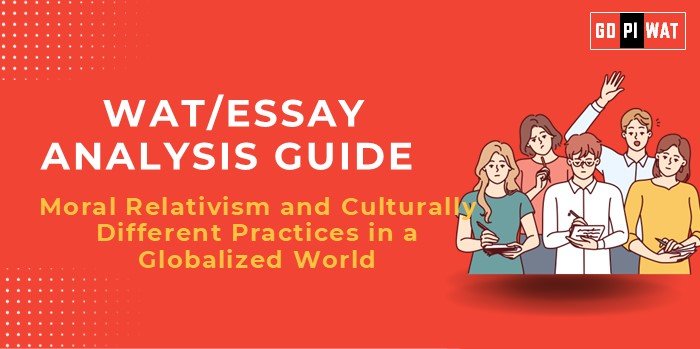📋 Group Discussion Analysis Guide: Moral Relativism and Culturally Different Practices in a Globalized World
🌐 Introduction to the Topic
Opening Context:
In an era of increasing globalization, cultures interact and sometimes clash, raising critical ethical questions. The concept of moral relativism, which posits that morality is culturally determined and subjective, plays a key role in understanding and possibly justifying these cultural differences.
Background:
Moral relativism has roots in cultural anthropology, emphasizing the idea that no one culture’s ethics are superior to another’s. This philosophical debate is heightened in a globalized world where human rights, business ethics, and international policies often intersect with diverse cultural norms.
📊 Quick Facts and Key Statistics
- 🌍 Globalization’s Scale: 79% of the world’s population uses at least one global digital platform, underscoring cultural interconnectivity.
- ⚖️ Cultural Conflicts: Reports indicate 62% of international businesses face ethical dilemmas rooted in cultural differences.
- 🌟 UNESCO Recognition: 200+ cultural practices are protected under UNESCO’s Intangible Cultural Heritage list.
- 🌎 Global Migration Trends: Over 280 million people live outside their countries of birth, often bringing cultural practices into new environments.
🧩 Stakeholders and Their Roles
- 🏛️ Governments: Balance respecting cultural practices with adhering to international laws.
- 🌐 International Organizations: Mediate disputes, set human rights benchmarks, and promote cultural diversity (e.g., UNESCO).
- 💼 Businesses: Navigate ethical challenges in global operations, such as labor practices and product marketing.
- 👥 Citizens and Cultural Groups: Advocate for their traditions while adapting to globalization.
🏆 Achievements and Challenges
✨ Achievements:
- 📜 Cultural Preservation Efforts: Initiatives like UNESCO’s Heritage programs safeguard diverse practices.
- ⚖️ Legal Protections: Countries like South Africa recognize customary laws alongside constitutional laws.
- 🌍 Corporate Adaptation: Multinational corporations (e.g., Unilever) develop policies that integrate cultural sensitivities.
⚠️ Challenges:
- 🤔 Moral Clashes: Practices like child labor or animal sacrifices often conflict with global ethical standards.
- 🌐 Cultural Erosion: Globalization risks homogenizing diverse cultural practices.
- ⚖️ Subjectivity in Morality: Lack of consensus on what is universally ethical.
🌎 Global Comparisons:
- 🇧🇹 Success: Bhutan’s Gross National Happiness integrates local traditions into governance.
- 🇫🇷 Conflict: France’s ban on religious symbols in public schools illustrates the tension between cultural practices and secular policies.
💬 Structured Arguments for Discussion
- Supporting Stance: “Moral relativism enables mutual respect and coexistence, reducing cultural hegemony in global ethics.”
- Opposing Stance: “Certain universal rights, like gender equality, must transcend cultural relativism to ensure global justice.”
- Balanced Perspective: “While respecting cultural practices is crucial, there should be boundaries to prevent harm or exploitation.”
📚 Effective Discussion Approaches
Opening Approaches:
- 📊 Statistical Insight: “With over 280 million migrants worldwide, moral relativism becomes essential in managing diverse cultural coexistence.”
- 💭 Philosophical Opening: “Can one moral framework truly fit all cultures in an interconnected world?”
Counter-Argument Handling:
- ✔️ Acknowledge Validity: “It is true that some practices are deeply rooted in history…”
- ❓ Question Impact: “…but how do they align with modern ethical standards like human rights?”
📈 Strategic Analysis of Strengths and Weaknesses
- ✔️ Strengths: Encourages diversity, reduces cultural imperialism, fosters global tolerance.
- ❌ Weaknesses: Potential misuse to justify harmful practices, challenges in creating unified policies.
- 💡 Opportunities: Promotes dialogue on global ethics, aids in international business strategies.
- ⚠️ Threats: Erosion of universal human rights standards.
🏫 Connecting with B-School Applications
Real-World Applications:
- 🌍 Useful in subjects like cross-cultural management, corporate ethics, and international relations.
Sample Interview Questions:
- ❓ “How would you resolve ethical dilemmas in international business stemming from cultural differences?”
- ❓ “Can a multinational company uphold moral relativism without compromising on universal standards?”
Insights for B-School Students:
- 💼 Recognizing cultural contexts is vital for ethical decision-making in global business.


